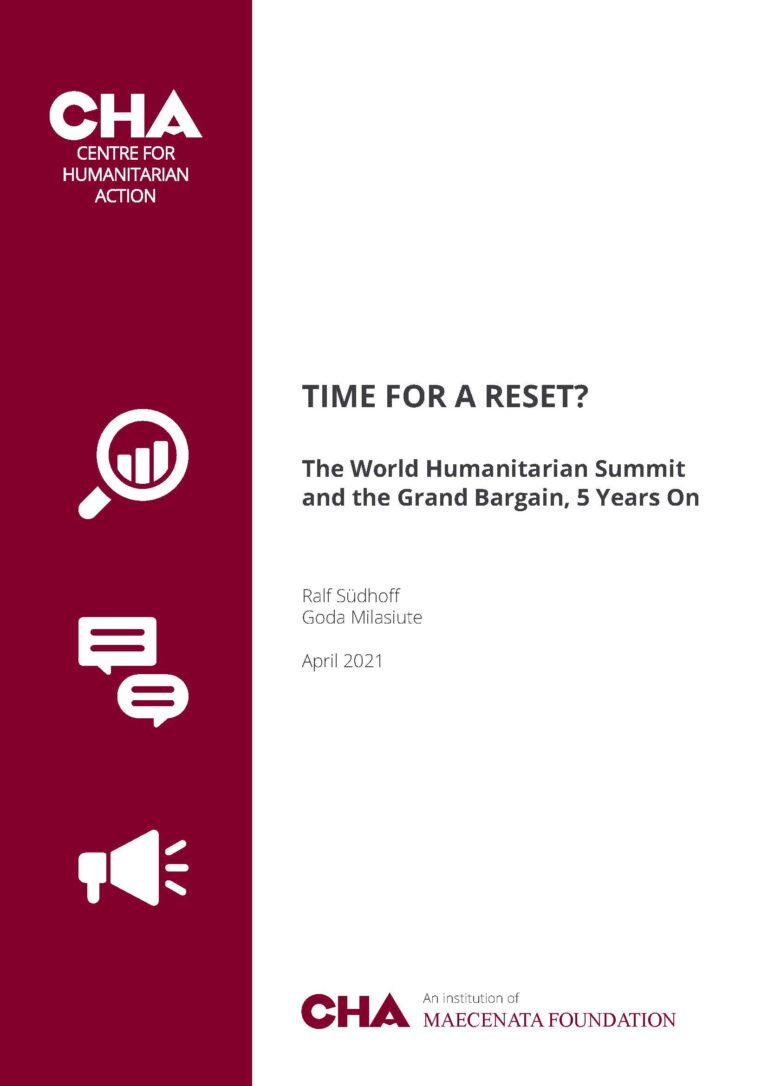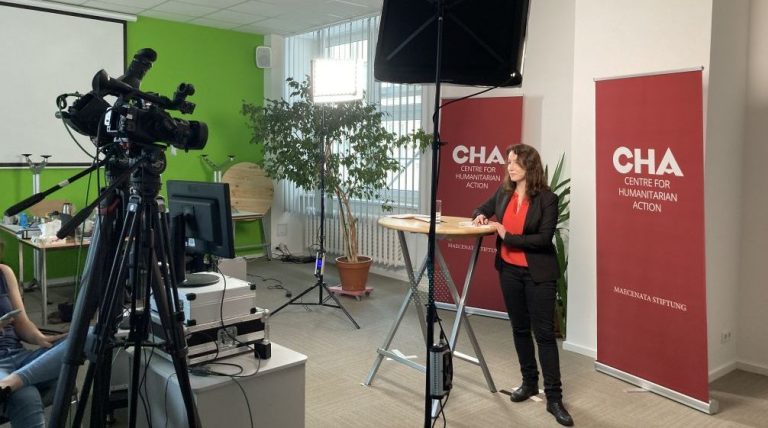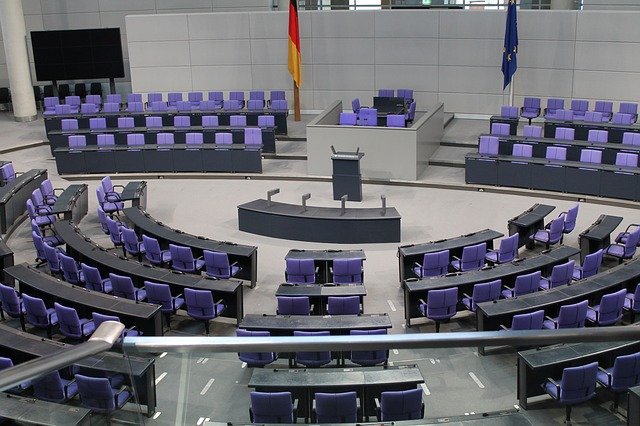| Author: | Ralf Südhoff, Goda Milasiute |
| Date: | 06.05.2021 |
| Downloads: |
Paper (DE)
Paper (EN) Paper (FR) |
The year 2021 might become an important turning point for global humanitarian aid as well as the Grand Bargain (GB) and its reform agenda. The Covid-19 pandemic represents an intensification of a series of underlying humanitarian challenges, which ought to be addressed by the GB, a comprehensive reform package that was first launched at the 2016 World Humanitarian Summit (WHS) for a period of five years. The results of the GB and its future will be discussed in June 2021. This CHA policy paper outlines the GB outcomes and the contributions by the German Government and civil society until now, as well as the key future challenges to be addressed by a potential “GB 2.0”.
This paper covers 10 theses on the achievements and the limitations of the Grand Bargain as a leading reform initiative for the humanitarian aid system:
1. The year 2021 might become an important turning point for global humanitarian aid as well as the Grand Bargain (GB) and its reform agenda. The Covid-19 pandemic represents an intensification of a series of underlying humanitarian challenges, which ought to be addressed by the GB, a reform package that was first launched at the 2016 World Humanitarian Summit (WHS). Since agreeing on the GB, a process of humanitarian aid reform was created that has been more inclusive and far-reaching than any other, as it brought together four groups of humanitarian actors: governments, international organisations (IOs), non-governmental organisations (NGOs) and the Red Cross / Red Crescent movement.
2. Five years after the WHS, the GB has triggered important discussions and initiated many pilot projects and programmes at the micro level. In so doing it helped identify highly relevant opportunities, oftentimes with impetus and support from the German Federal Government. However, the GB has so far very rarely changed processes sustainably at the macro level or developed a systemic relevance that would amount to substantial reforms.
3. With regard to many of the initiatives it sparked, the GB has so far remained predominantly output-oriented and has rarely achieved comprehensive outcomes. The GB’s aims defined in this paper as process-relevant (more transparency, more flexible financing, a reduction of bureaucracy) oftentimes materialised in interesting pilot projects, but rarely in a change of the processes themselves. At the same time, the GB’s aims defined in this paper as system-relevant set important initiatives in motion. Fundamental questions, for instance concerning the localisation of aid and a so-called participation revolution of actors from the Global South, as well as cross-cutting issues such as an integrated Humanitarian-Development-Peace Nexus approach, gender equality or humanitarian innovation, were not furthered in any decisive way. The responsibility for important advances as well as slow implementation of the GB’s aims lies with governments as well as United Nations (UN) agencies and (I)NGOs.
4. German public engagement in the GB has engendered considerable success. The Federal Government’s high and financially growing engagement goes hand in hand with an increase of multi-year funding, simpler reporting procedures and approaches for an “anticipatory humanitarian action”, which may render the humanitarian system far more effective and efficient. Nonetheless, there often is a lack of transparency, and only some German initiatives continue beyond a pilot phase.
5. The results attained by both international and German aid organisations with regard to their GB commitments are mixed as well, and criticism of “cherry-picking” depending on organisational interests is common. A lack of transparency among some UN agencies and (I)NGOs reporting on their GB achievements must be asserted, including the GB aim – often underlined by INGOs – of a localisation of humanitarian aid and its means.
6. In future, it seems necessary to implement a thematic focus on the topics that are of a high strategic relevance for the GB, such as localisation of aid, quality funding and gender equality. At the same time, this requires clear goals and indicators on how these goals may be implemented and strategically advanced beyond the project level. Because of their strong influence, donor institutions have a special responsibility in this context among the signatories of the GB.
This is why influential donors such as the German Federal Government ought to take action on the following issues:
a) Concerning the localisation of humanitarian action, international aid organisations should be required to provide reasons if they choose not to cooperate with local partners on the ground. A percentage of administrative expenses should be stipulated in programme funding for onward transfer to local partners, and be partially covered by donors like the German Federal Foreign Office (GFFO) to promote local capacity building. Cooperation on an equal footing between IOs and INGOs with local actors should be made a relevant criterion for funding, and thus enable a systemic change in the medium term. The so-called pooled funds should be used on a much greater scale for localisation efforts, as, among other things, they can ease the burden of donors with a high administrative load such as Germany, and push back organisational interests. At the same time, local actors’ access to these funds and their participation in all relevant committees on the ground needs to be ensured, for instance via trainings.
b) Concerning the quality of humanitarian financing, flexible programme funding should replace project funding as the norm, and the GB goals for multiyear, flexible funding should be implemented in a meaningful manner. Suggestions such as the eleven “best practice examples” in the “Catalogue of quality funding” (FAO, DI and NRC 2020) should be taken up seriously. In this context, too, pooled funds are gaining traction when it comes to allocating resources flexibly and transparently. Most donors, however, have a long way to go until reaching the WHS goal of allocating 15% of their means in such funds.
c) Gender-sensitive or gender-transformative humanitarian aid, needs to be taken seriously as a cross-cutting issue by placing greater emphasis on the substantial and transformative quality in funding decisions versus “box-ticking” in project applications. The programmes’ impact needs to be measured by transparent indicators and be made the basis of future funding decisions.
7. In order to render the GB process- and system-relevant, a refocusing of the reform plan on strategic issues, political momentum and measurable reform projects are necessary. At the same time, the increasingly threatened humanitarian space and its principles must also be protected in the GB context and its actions.
8. Within Germany’s humanitarian aid and its commitment to the GB, too, humanitarian principles must be heeded more consistently. On the one hand, the Federal Government has started important political initiatives to protect humanitarian principles and international law. On the other hand, these partly contradict other approaches of the Federal Government, such as a mixing of humanitarian and security policy goals in the GB-relevant Triple Nexus issues, or German and European migration, sea rescue and arms export policies, which lead to an incoherent humanitarian commitment. Institutionally, too, humanitarian aid in the GFFO should be strengthened through the creation of an independent and well-staffed “Department for Humanitarian Aid”.
9. In 2016, international political commitment at a high level of seniority – for instance by the German Chancellor – decisively ignited the momentum of the WHS and thus of the GB. Such momentum in the spirit of the GB and the humanitarian reform is needed again. On the German side, for example, this would require a higher prioritisation of humanitarian issues by the highest management level in the GFFO.
10. If the above-mentioned changes are tackled successfully, from 2021 on, the GB could turn into a catalyst for reforms in humanitarian aid which, in the face of record numbers of people in need, is more important today than ever, and for this very reason needs to change fundamentally.
The complete paper can be downloaded as PDF.





